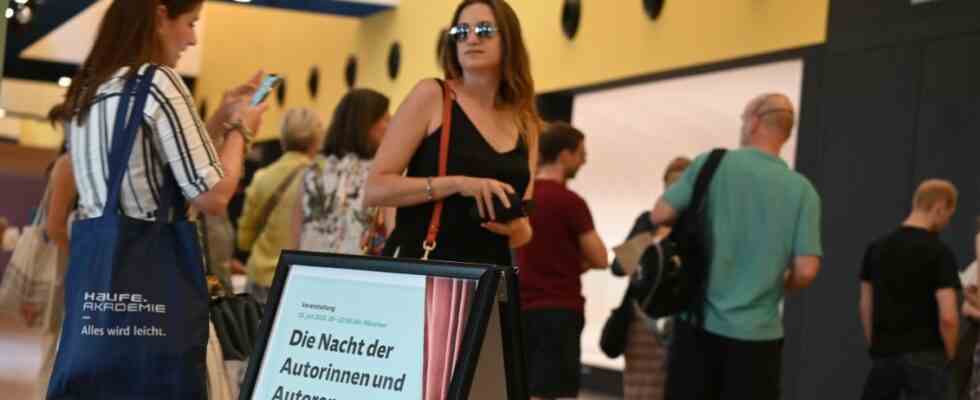It was far from night, more like a wonderful warm, bright summer evening at the Volkstheater in the slaughterhouse district, and while the future of journalism was being negotiated inside, among other things, a class reunion mood set in outside: The authors of the Süddeutsche Zeitung, which this Friday evening from reported on their work, some hadn’t seen each other in person for two years, there was a big hello, there was a lot to tell.
Not that the program inside, on the two stages, also in the Luise cultural center, in the competence center for educational professions and in the Zunfthaus restaurant was uninteresting: In 20 panels, editors answered the questions of the around 1000 visitors and reported on their everyday editorial work and about special research.
Political boss Stefan Kornelius (on the left in the picture), moderated by political boss Katharina Riehl, discussed with …
(Photo: Stephan Rumpf/Stephan Rumpf)
With a proven need for feuilletonistic recognition, streak light curator Hilmar Klute discussed pacifism and warmongering in times like these with head of politics Stefan Kornelius, war reporters like Sonja Zekri talked about the difficulties of obtaining information in the noise of battle.
It shouldn’t just be serious, according to Streiflicht authors, Felicitas Kock and Martin Zips reported on the daily attempt not only to depict the misery and misery of the world in the newspaper, but also to bring a smile, a little confidence and optimism to the paper.
.. Hilmar Klute, who is responsible for the spotlight, about the turning point that the war in the Ukraine means.
(Photo: Stephan Rumpf)
On Stage 2 in the Volkstheater, Susi Wimmer and Martin Bernstein, the court reporter and police reporter in the Munich local editorial office, brought one of the most complex and spectacular investigations of recent years with them: the cocaine scandal in the Munich police force.
Court reporter Susi Wimmer and police reporter Martin Bernstein revealed how the coke scandal was exposed by the Munich police.
(Photo: Stephan Rumpf)
37 police officers have been and are being investigated, and some have already been convicted — “knee-deep in the dirt,” as the reporters call the state of part of the agency. Researched in tremendous detail and then written down with humor where possible. Wimmer and Bernstein showed what local journalism can achieve if you give it time and opportunity – breathtakingly exciting.
Meanwhile, Heribert Prantl, who has been an outstanding commentator for the Süddeutsche Zeitung for many years and who has been retired for some time, began his lecture with a quote from the Czech writer Johannes Urzidil: “My homeland is what I write.” Prantl spoke about the “poetics of writing”, why a tidy desk and order in the thoughts are necessary; he remembered Johannes Willms, who died this week, former head of the arts section of the SZ, according to Prantl a “life artist, a paragon of esprit”, he made Friedrich Schiller’s topic his own at his inaugural lecture in Jena and asked: Why and for what end there journalism? The speaker complained that nobody listened to him and confessed that a “certain vanity” is part of the profession, an insight that few would contradict him.
Many spellbound guests: Opinion leader Heribert Prantl, once a member of the SZ editor-in-chief, gave his view of society and the profession on a stage with Alexandra Föderl-Schmid, who has been a member of the editor-in-chief for two years.
(Photo: Stephan Rumpf)
Christina Berndt and Werner Bartens, both members of the science editorial team, found almost no end to their report on how the newspaper was dealing with the Covid pandemic – about the need to leave the noble science reporting and play a bit of adult education , simply because there was a great need for simple information on how to deal with the plague.
Christina Berndt (left) and Werner Bartens (right) from the knowledge department, moderated by department head Marlene Weiß (centre), explained why it is important to keep explaining things anew in times of a pandemic.
(Photo: Stephan Rumpf)
In the audience, Judith Wittwer and Wolfgang Krach waited patiently for their performance; they then reported on difficult decisions in times of war, on the verification of news and images, also on the “emotional bias” in view of the war in Ukraine and how this should not influence the attempt at objectivity.
When does it become too dangerous for reporters in a crisis area? Among other things, this was the question during the round with editor-in-chief Judith Wittwer and editor-in-chief Wolfgang Krach.
(Photo: Stephan Rumpf)
Krach reported on the editor-in-chief’s responsibility when reporters have to be sent to the war zone or when the Russia correspondent is to remain in Moscow despite Putin’s fake news law: the home office must then also know that in texts by the correspondent this is by no means the case The word “war” is allowed to appear, otherwise she faces 15 years in prison.
It was still not dark outside at this time, so the “Night of the Authors” took place in the greatest possible light – until it was continued in one or the other bar after the end of the program – as befits a reasonable class reunion.

